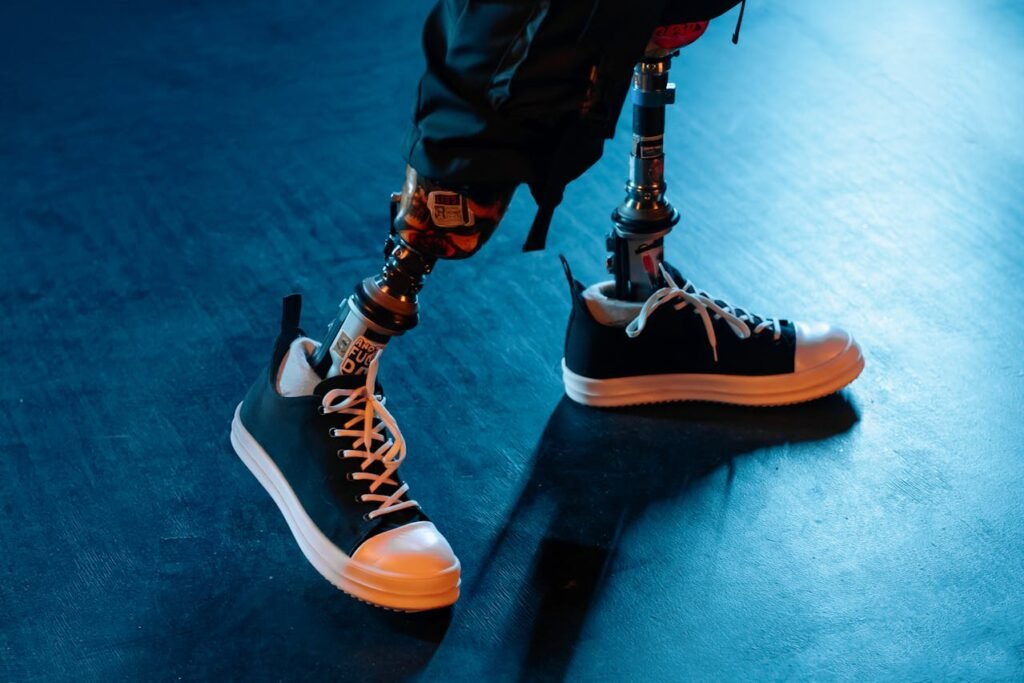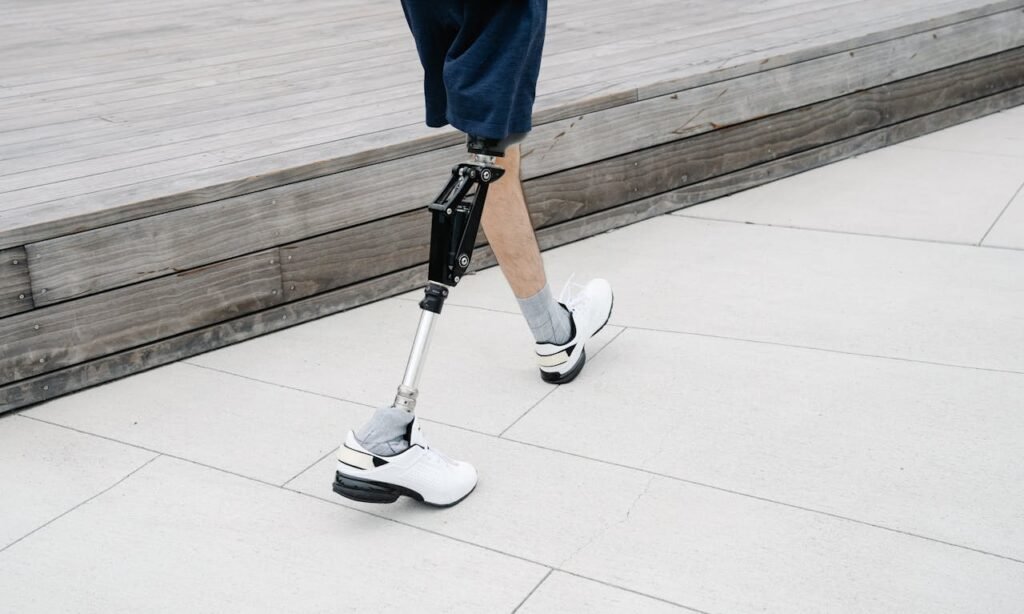For individuals who need prosthetic devices, navigating the journey from choosing the right prosthetic to understanding how to pay for it can be overwhelming. While prosthetics are life-changing tools that restore mobility and independence, they often come with a high price tag. Fortunately, many insurance policies provide coverage for prosthetic devices, easing the financial burden. However, understanding the specifics of insurance coverage is crucial to avoid unexpected expenses and ensure you’re fully informed.
At Robobionics, we believe that everyone deserves access to quality prosthetics. This article breaks down the essential details of how insurance typically covers prosthetic devices, what to look for in your policy, and practical steps to make the most of your benefits. Whether you’re an individual seeking clarity or a caregiver assisting a loved one, this guide will empower you with the knowledge you need.
Understanding Insurance Coverage for Prosthetic Devices
Insurance coverage for prosthetic devices varies widely based on the provider, the policy, and even the region. While most comprehensive health insurance plans include prosthetic coverage, the extent of that coverage depends on specific terms and conditions. Gaining a clear understanding of what is included—and what isn’t—can save you time, money, and frustration.
Key Elements of Prosthetic Coverage
The first step in understanding your coverage is identifying what your insurance plan specifies about prosthetic devices. Policies generally outline the types of prosthetics covered, the circumstances under which they are approved, and the limits of the coverage.
Some policies may cover only standard prosthetics, while others might include advanced devices like multi-articulating hands or prosthetics with sensory feedback.
It’s also important to note whether your insurance covers the full cost of the device or only a portion. In many cases, insurers provide partial coverage, requiring you to pay a deductible or copay. Additionally, coverage for follow-up care, repairs, and replacements can vary significantly.
Pre-Authorization Requirements
Many insurance companies require pre-authorization before approving coverage for a prosthetic device. This process involves submitting medical documentation that demonstrates the need for the device, including a prescription from a qualified healthcare provider.
Pre-authorization is designed to ensure that the prosthetic is medically necessary and appropriate for the individual’s condition.
For individuals navigating this process, it’s essential to work closely with your doctor and prosthetic provider. Having all the required documentation ready can streamline the approval process and reduce delays.

What to Look for in Your Policy
When reviewing your insurance policy, pay attention to specific terms and conditions related to prosthetic devices. Policies often include detailed clauses that can significantly impact your out-of-pocket costs and access to the device you need.
In-Network vs. Out-of-Network Providers
Insurance plans typically have a network of approved providers, and using an in-network provider often results in lower costs. If your chosen prosthetic provider is out-of-network, you may face higher expenses or even a denial of coverage.
Confirming that your prosthetic provider is part of your insurance network is a crucial step before proceeding with any purchase or fitting.
Lifetime Maximums and Limits
Some insurance policies impose lifetime maximums or annual caps on prosthetic coverage. For example, a policy might specify that it will cover only one prosthetic limb every five years.
If you need a replacement or upgrade within that period, you could be responsible for the full cost. Understanding these limits can help you plan for potential future expenses.
Navigating Common Challenges in Prosthetic Insurance Coverage
While insurance policies often provide a degree of financial relief, navigating their complexities can be challenging. Understanding potential hurdles and knowing how to address them is essential for making the most of your benefits.
Dealing with Denials
Insurance companies may deny coverage for various reasons, such as insufficient documentation, use of out-of-network providers, or claims that the prosthetic is not medically necessary. Receiving a denial can be disheartening, but it’s not the end of the road.
The first step is to request a detailed explanation of the denial from your insurance provider. In many cases, the issue can be resolved by submitting additional documentation or appealing the decision.
Working with your healthcare team and prosthetic provider to provide detailed medical records and justifications can significantly increase your chances of success.
For businesses like Robobionics, supporting users through this process by offering documentation and expert advice strengthens trust and ensures they can access the devices they need.
Understanding “Medically Necessary”
The term “medically necessary” is a common requirement in insurance policies but can be open to interpretation. For prosthetics, this usually means the device is essential for restoring mobility or performing daily activities.
Advanced prosthetics with specialized features may be harder to justify under this standard unless a strong case is made for their necessity.
Working with a qualified clinician to provide detailed assessments and descriptions of how the prosthetic will improve the user’s quality of life can make a significant difference in obtaining approval.

Steps to Maximize Your Prosthetic Insurance Benefits
Making the most of your insurance coverage for prosthetic devices requires strategic planning and proactive steps. By taking the following actions, you can minimize out-of-pocket costs and streamline the process.
Work with Experienced Providers
Choosing a prosthetic provider who is experienced in working with insurance companies can make the process significantly easier. These providers often have dedicated teams to handle pre-authorizations, claims submissions, and appeals, ensuring that your case is presented as effectively as possible.
Robobionics, for instance, works closely with users and their insurance companies to simplify the process. From detailed documentation to follow-up support, our team is committed to helping users access the devices they need without unnecessary delays or complications.
Developing a Clear Plan
Maximizing insurance benefits begins with developing a thorough understanding of the coverage offered by your policy.
This requires a proactive approach to reviewing the fine print, including details about eligibility criteria, coverage limits, and exclusions. Seeking guidance from a prosthetic provider with experience in insurance claims can streamline this process.
Providers like Robobionics often have dedicated teams that specialize in working with insurers, helping users interpret policy terms and identify potential gaps.
Navigating the Claims Process
Filing insurance claims for prosthetic devices can be a complex and time-sensitive process. Ensuring that all required forms are submitted accurately and on time is essential to avoid unnecessary delays or denials.
When issues arise, such as denied claims, understanding the appeal process becomes crucial. Many users are unaware of their right to appeal, leaving them vulnerable to accepting unfavorable outcomes.
For businesses, offering claims support services can make a significant difference. Acting as an intermediary between the user and the insurer can simplify communication and improve outcomes. By providing clear instructions, checklists, and real-time updates, businesses can ensure users feel supported throughout the process.
Building Strong Documentation
Accurate and well-organized documentation is critical for maximizing insurance benefits. This includes not only the initial paperwork for pre-authorization but also records of any interactions with the insurance company, such as emails, phone calls, and correspondence regarding claims or appeals.
Keeping a record of medical evaluations, prescriptions, and justifications for specific devices creates a solid foundation to address any challenges or denials.
For businesses, offering tools and templates to help users organize and track their documentation can enhance customer satisfaction and ease the burden of navigating insurance processes.
This could include digital solutions like user-friendly apps or online portals that centralize medical and insurance records in one accessible location.

Advocating for Comprehensive Coverage
In many cases, insurance policies may offer partial coverage for prosthetic devices or exclude advanced features like multi-articulating hands and sensory feedback systems.
Users often need to advocate for additional support by demonstrating how a specific prosthetic will improve their quality of life. For example, providing evidence of how an advanced device will enable a return to work or reduce the need for long-term healthcare can make a compelling case to insurers.
Businesses that equip users with the knowledge and resources to advocate effectively strengthen their position as trusted partners.
Hosting informational sessions or providing tailored consultation services can empower users to present their case confidently, ensuring they receive the best possible coverage.
Understanding Replacement, Repairs, and Maintenance
Prosthetic devices are not a one-time investment—they require ongoing care to remain functional and effective. Insurance coverage for replacements, repairs, and maintenance is another critical factor to consider when navigating your policy.
Replacement Policies
Prosthetic devices often need to be replaced due to wear and tear, changes in the user’s physical condition, or advancements in technology. However, insurance policies typically specify a minimum time frame before approving replacements, often ranging from three to five years.
In cases where a replacement is required earlier—such as if the device no longer fits properly or a component fails—it’s essential to provide thorough documentation. A physician’s recommendation and evidence of the device’s current condition can strengthen your case for an exception to the policy.
Businesses can support users by offering detailed evaluations and reports that justify the need for a replacement, ensuring the insurance provider has the necessary information to approve the claim.
Repair Coverage
Insurance policies often include provisions for repairs but may limit the frequency or cost of covered services. Some plans cover minor repairs fully, while others require a copay or impose caps on the total expense. Knowing the specifics of your policy ensures you’re prepared for potential repair costs.
For businesses, offering affordable and efficient repair services helps build trust with users and ensures they can maintain their devices without excessive financial strain.
Routine Maintenance
Maintenance is essential to prolonging the lifespan of prosthetic devices, but not all insurance plans cover routine care. Policies that do provide coverage may require users to visit specific service providers.
Educating users on proper maintenance practices and providing affordable service options can help businesses differentiate themselves while supporting long-term user satisfaction.
Understanding Regional and Employer-Specific Plans
Prosthetic insurance coverage often varies depending on location and employer-specific policies. In some countries or regions, prosthetic devices are covered under national healthcare systems, while in others, private insurance plays a larger role. Similarly, employer-sponsored health plans may offer additional benefits for prosthetic coverage.
For individuals, understanding regional regulations and employer-provided benefits is essential to maximizing coverage. For businesses, tailoring services to regional and organizational policies can enhance accessibility and relevance.
Navigating Regional Differences
In many countries, healthcare systems and insurance frameworks are deeply influenced by local regulations and cultural attitudes toward disability and assistive devices.
Some regions have national healthcare systems that provide extensive prosthetic coverage as part of public benefits, while others rely heavily on private insurers, leading to discrepancies in access and quality.
For example, countries with universal healthcare may cover standard prosthetics under their national plans but offer limited access to advanced devices like multi-articulating hands or sensory-enabled prosthetics.
Conversely, regions dominated by private insurance may provide greater flexibility but often impose higher out-of-pocket costs for users.

Tailoring Employer-Sponsored Plans
Employer-sponsored health plans often offer a level of customization that allows organizations to include benefits tailored to their workforce’s unique needs.
Companies committed to inclusivity and employee well-being can use these plans to provide comprehensive prosthetic coverage, setting a benchmark for progressive workplace policies.
Employers that include prosthetic coverage in their plans send a strong message of support to employees with disabilities, fostering loyalty and engagement.
Beyond the moral imperative, these policies also benefit businesses by enabling employees to return to work more quickly and perform their roles effectively.
For example, an employer-provided plan that covers advanced prosthetics can empower an employee in a manual or creative profession to regain their full productivity.
The Role of Supplemental Policies
In regions or industries where standard health insurance plans fall short, supplemental policies can provide critical support. These add-on policies often include specialized coverage for advanced prosthetics, repairs, and even rehabilitation services.
While they typically come at an additional cost, they can be a valuable investment for individuals who need more comprehensive benefits.
Businesses in the prosthetics field can collaborate with insurance providers to develop supplemental plans tailored to the needs of prosthetic users.
Highlighting the benefits of these policies—such as reduced financial strain and access to cutting-edge devices—can help drive adoption and ensure users are fully supported throughout their prosthetic journey.
Strategic Insights for Businesses
Understanding regional and employer-specific plans is not just about adapting to market conditions—it’s about identifying opportunities to lead. By addressing the gaps and challenges in coverage, businesses can play a proactive role in shaping policies that prioritize accessibility and inclusivity.
Engaging with policymakers to advocate for standardized coverage requirements across regions can help reduce disparities and expand access to prosthetics.
Similarly, collaborating with large employers to integrate advanced prosthetic coverage into health plans can demonstrate leadership and create a ripple effect across industries.
The Role of Advocacy in Expanding Coverage
Advocacy plays a crucial role in shaping insurance policies for prosthetic devices. As awareness of the life-changing impact of advanced prosthetics grows, businesses, users, and organizations can work together to influence policy changes that expand coverage.
Engaging with policymakers, contributing to industry forums, and supporting user-led advocacy initiatives are effective ways for businesses to drive change.
By participating in these efforts, businesses not only enhance their reputation but also contribute to a more inclusive and equitable healthcare system.
Building Awareness of the Real-World Impact
One of the first steps in effective advocacy is raising awareness about the transformative impact of prosthetic devices. For many individuals with limb loss, prosthetics are not a luxury but a necessity that enables them to regain independence, pursue careers, and engage meaningfully in their communities.
Highlighting real-life stories of individuals who have benefited from prosthetics can be a compelling way to humanize the issue and underscore the importance of comprehensive coverage.
Businesses can play a pivotal role by amplifying these stories through social media campaigns, blogs, and collaborations with advocacy groups.
By framing prosthetic coverage as an issue of empowerment and equality, organizations can shift the narrative from cost to value, making it easier to engage stakeholders in meaningful dialogue.

Influencing Policy Through Strategic Partnerships
Advocacy often requires collaboration across multiple sectors to be effective. By partnering with non-profits, patient advocacy groups, and medical associations, businesses can amplify their voice and reach a wider audience.
These partnerships create a united front that can push for legislative changes, such as mandating minimum standards for prosthetic coverage in insurance policies or introducing subsidies for advanced devices.
For example, organizations can work together to lobby for the inclusion of advanced prosthetic devices like multi-articulating hands under government healthcare schemes.
Demonstrating how these devices enable individuals to contribute to the workforce and reduce long-term healthcare costs strengthens the case for expanded coverage.
Supporting Grassroots Advocacy
Grassroots efforts—led by individuals and communities affected by limb loss—are at the heart of effective advocacy. Businesses can support these efforts by providing resources, platforms, and funding to empower individuals to share their experiences and advocate for change.
For instance, businesses might sponsor advocacy training programs that teach users how to navigate public speaking, media engagement, or legislative meetings.
Empowered users can then become ambassadors for the cause, sharing their stories and advocating for policy changes that prioritize prosthetic coverage.
The collective impact of these voices, combined with business-led initiatives, can create a ripple effect that influences both public perception and policy decisions.
Demonstrating the Economic Case for Coverage
One of the most persuasive arguments for expanded prosthetic coverage lies in its economic benefits. Advanced prosthetics allow individuals to return to work, reduce dependency on healthcare systems, and contribute to the economy. By highlighting these benefits, businesses can frame prosthetic coverage as an investment rather than an expense.
Detailed case studies, backed by data, can demonstrate the cost savings and productivity gains associated with prosthetic use.
For instance, showcasing the reduced need for ongoing medical care or increased earning potential of individuals with access to advanced prosthetics can help insurance providers and policymakers understand the long-term value of comprehensive coverage.
Leveraging Technology to Drive Advocacy
Technology plays a critical role in modern advocacy efforts, enabling businesses and stakeholders to reach broader audiences and streamline campaigns.
Digital platforms, such as social media, webinars, and virtual town halls, allow advocates to share their message widely and engage directly with decision-makers.
Businesses can use these platforms to host discussions on the importance of prosthetic coverage, share user testimonials, and provide educational content about the latest advancements in prosthetic technology.
Virtual engagement also allows stakeholders from different regions to collaborate, ensuring that advocacy efforts are cohesive and far-reaching.

Conclusion
Navigating the complexities of insurance coverage for prosthetic devices can be daunting, but with the right information and proactive steps, individuals can secure the financial support they need.
From understanding policy terms to handling claims and addressing challenges like denials, a strategic approach ensures access to the life-changing benefits prosthetics provide.
For businesses, offering guidance, advocacy, and user-friendly services can make a meaningful difference in users’ lives.
By simplifying processes, partnering with insurers, and supporting regional and global efforts to expand coverage, organizations like Robobionics play a vital role in shaping a more accessible and inclusive future.



